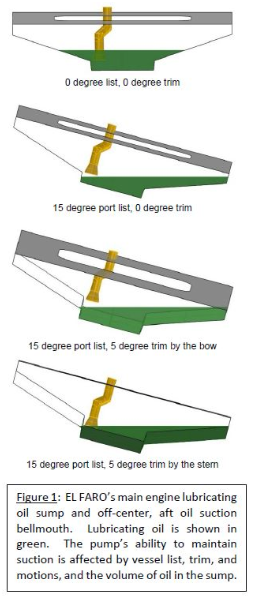USCG: the role of main propulsion lube oil system in the loss of the El Faro
The United States Coast Guard (USCG) has distributed Marine Safety Alert 04-18 “Compliance with SOLAS and USCG Regulations for Operation of Main Propulsion and Essential Auxiliary Machinery: Lessons Learned from the SS El Faro Casualty,” in order to inform operators of the role that the main propulsion lube oil system was found to have played in the El Faro casualty, in which 33 lives were lost. This alert also recommends that operators, especially ship engineers, review the operational procedures and limitations of vital propulsion machinery, and verify compliance with International Convention for the Safety of Life at Sea (SOLAS), Classification Society and regulatory standards.
The USCG Marine Board Report on the sinking of the El Faro revealed that the loss of propulsion during extremely heavy weather was a contributing factor to the sinking of the vessel. The exact operational status of all vital El Faro engineering equipment during the hours preceding the casualty could not be determined. However, bridge audio recordings indicated that the vessel lost lube oil pressure to the main propulsion turbine and reduction gear bearings, resulting in loss of propulsion. It is believed that the vessel’s substantial list, coupled with trim by the bow, caused the main engine lube oil pump to lose suction. A detailed modelling and static analysis of El Faro’s lube oil system determined that a severe inclination of the ship, coupled with a relatively low volume of oil in the sump, would likely result in a loss of pump suction.
Figure 1 below shows examples (at a constant lube oil volume) of the position of the suction bellmouth relative to the level of lube oil in the sump in several heel and trim conditions. This static model does not attempt to address the sloshing of lube oil in the sump caused by vessel motions.

The USCG Alert 04-18 can be seen on the USCG website.
Safety Event
Published: 14 June 2018
Download: IMCA SF 12/18
IMCA Safety Flashes
Submit a Report
IMCA Safety Flashes summarise key safety matters and incidents, allowing lessons to be more easily learnt for the benefit of all. The effectiveness of the IMCA Safety Flash system depends on Members sharing information and so avoiding repeat incidents. Please consider adding [email protected] to your internal distribution list for safety alerts or manually submitting information on incidents you consider may be relevant. All information is anonymised or sanitised, as appropriate.
IMCA’s store terms and conditions (https://www.imca-int.com/legal-notices/terms/) apply to all downloads from IMCA’s website, including this document.
IMCA makes every effort to ensure the accuracy and reliability of the data contained in the documents it publishes, but IMCA shall not be liable for any guidance and/or recommendation and/or statement herein contained. The information contained in this document does not fulfil or replace any individual’s or Member's legal, regulatory or other duties or obligations in respect of their operations. Individuals and Members remain solely responsible for the safe, lawful and proper conduct of their operations.
